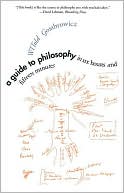Just before he died in 1969, Witold Gombrowicz drafted this remarkable romp through European philosophy as a series of terse “lessons” for his wife Rita. The line of thought runs from Kant, Schopenhauer, Hegel, Husserl and Kierkegaard through Nietzsche, Heidegger and Sartre, with a final flourish on Marx. “Philosophy is needed for a global view of culture. It is important for writers,” he says. “Philosophy allows us to organize culture, to introduce order, to find ourselves, and to attain intellectual confidence.” But Gombrowicz expresses as much empathy for philosophers as he does appreciation, stranded as they are between the concrete and the abstract. He writes, “Now, in my view, man is divided between the subjective and the objective, irreparably and for all time. This is a kind of wound we have which is impossible to heal, and of which we are more and more conscious. In a number of years, it will be even ‘bloodier,’ since it can only grow with the evolution of consciousness.”
 The shape of this book’s project is also its subject. Responsive to existentialism, Gombrowicz embraces its updated brand of freedom, detached from overbearing causality. How shall we act in the future, which is always upon us? One answer is to compress thought into tight comprehension – to speed up the flow of thought through time. What took the philosophers 150 years to accomplish we must organize urgently in a few hours. There is, in fact, no time: Gombrowicz is dying from heart disease.
The shape of this book’s project is also its subject. Responsive to existentialism, Gombrowicz embraces its updated brand of freedom, detached from overbearing causality. How shall we act in the future, which is always upon us? One answer is to compress thought into tight comprehension – to speed up the flow of thought through time. What took the philosophers 150 years to accomplish we must organize urgently in a few hours. There is, in fact, no time: Gombrowicz is dying from heart disease.
The writing is clipped, the voice declarative, the tone often personal. No extended paragraphs here, but just enough words to carry a quick summation, a piercing observation, an exclamation. He is saying: Philosophy evolves over decades, but we can see it is in fact compact. If philosophy is often about our relation to time, we’re now in a position to ask what time is required for. Each person, like each philosophy, must find the necessary element in what are otherwise arbitrary choices. “In each philosophy, there is a fundamental choice which is arbitrary, and everything else, system, reasoning, only serve to justify this choice — to prove that it responds to reality.” This sly book delivers us to the crucial decision point of the writer, by way of a brisk, weighed respect for the philosophers.
In this way, he condenses the key insights of these thinkers and acknowledges their critical impact on his self-awareness. With each teacher, consciousness is further reduced to a confrontation with what it alone is experiencing. Of Husserl: “Phenomenology is a descent to the most profound notion, the last notion of a phenomenon, and when it is purified, we throw ourselves upon it and swallow it by direct intuition. I remind you that intuition is direct knowledge without reasoning.”
 In his ironic novels, Gombrowicz pitched himself against enslaving customs and rites. So of course, Sartre had much to offer him. “All of Sartrean morality consists of recognizing and of affirming freedom.” But as an iconoclastic Polish writer, whose work was withheld in his own country by a Communist regime, he ultimately pops Sartre’s balloon. “Consequently, Sartre naturally insists that every writer be engaged, that he belongs to the left, and that he be subject to its rigorous rules! … Sartre tries above all to reconcile existentialism with Marxism, which naturally is nonsense … I imagine that in twenty or thirty years, they will discard Marxism.” Exactly. Nevertheless, there is Heidegger pointing out the difference between banal, daily existence and “authetic existence”: “In light of this idea, you see that there are very few people who have human lives.”
In his ironic novels, Gombrowicz pitched himself against enslaving customs and rites. So of course, Sartre had much to offer him. “All of Sartrean morality consists of recognizing and of affirming freedom.” But as an iconoclastic Polish writer, whose work was withheld in his own country by a Communist regime, he ultimately pops Sartre’s balloon. “Consequently, Sartre naturally insists that every writer be engaged, that he belongs to the left, and that he be subject to its rigorous rules! … Sartre tries above all to reconcile existentialism with Marxism, which naturally is nonsense … I imagine that in twenty or thirty years, they will discard Marxism.” Exactly. Nevertheless, there is Heidegger pointing out the difference between banal, daily existence and “authetic existence”: “In light of this idea, you see that there are very few people who have human lives.”
But the critique of the human, for Gombrowicz, simply does not automatically lead to a progressive system. On the one hand, Gombrowicz is a “user” of existentialist basics: “Moving from this inauthetic sphere to the authentic does not consist of a process of culture, but of what [Heidegger] calls a leap, a decision to accept anguish and its revelation … Anguish is the fear of nothing.” Mankind creates meaning to fill a frightening void. On the other hand, Gombrowicz offers a bitter critique of the effects of existential thought on the process of culture: “It is an experience of nothingness and one of the main sources of the mania for nothingness which has stupidly taken hold of European culture and literature.” And so, in 1969, Gombrowicz could already see how the cultural imperatives of leftist intelligentsia would hobble some of its literature, namely by disparaging meaning-making.
 Core Gombrowicz: “I am of the school of Montaigne, and I favor a more moderate attitude: we must not succumb to theories, but must know that systems have a very short life and not allow ourselves to be imposed on … Man’s relationship with his most profound thinking is characterized by his immaturity. It is like a schoolboy who strives to say important things with a frivolous aim of surpassing others … Authentic existence asserts man’s finiteness. It has moral constraints. It does not permit having a clear conscience.” There we see where this meditation on philosophy has been headed all along: a potentially productive and authentic position for the writer. Gombrowicz’s compression of philosophy suggests the requirement both to honor and exploit. Be responsible and respectful to the sweep of innovative thought, but watch out for system creep and language machines, from the left or the right. He says, “All philosophical thought is generally utopian and leads nowhere.”
Core Gombrowicz: “I am of the school of Montaigne, and I favor a more moderate attitude: we must not succumb to theories, but must know that systems have a very short life and not allow ourselves to be imposed on … Man’s relationship with his most profound thinking is characterized by his immaturity. It is like a schoolboy who strives to say important things with a frivolous aim of surpassing others … Authentic existence asserts man’s finiteness. It has moral constraints. It does not permit having a clear conscience.” There we see where this meditation on philosophy has been headed all along: a potentially productive and authentic position for the writer. Gombrowicz’s compression of philosophy suggests the requirement both to honor and exploit. Be responsible and respectful to the sweep of innovative thought, but watch out for system creep and language machines, from the left or the right. He says, “All philosophical thought is generally utopian and leads nowhere.”
The one who critiques the culture – and that often included Gombrowicz – may wish to smash religion, law, and philosophy, since they are all allegedly used by the powerful to exploit the weaker and thus organize their consciousness. But Gombrowicz, along with Milosz in The Captive Mind, saw where widescale systems of social improvement tend to take us. Thus, he recommended moderation. Given fresh powers from a new regime, I wonder which aggrieved writers among us today would be most tempted to take punitive measures against the literary infidels, the “poetry establishment”? Gombrowicz’s point is that the potential for this sort of competitive brutality is always present, however tamped down or disguised as political altruism.
 Gombrowicz in 30 seconds: Born 1904 near Kielce, Poland. Dies 1969 near Nice, France. Parents wealthy gentry. Studies law at Warsaw University. Earns law degree in 1927, but can’t or won’t find work. Starts writing stories and reviews. In 1937 Ferdydurke, a novel, brings acclaim. In 1939, while on the maiden voyage of a cruise ship, Germany invades Poland. He decides to wait in Buenos Aires until war’s end. Stays until 1963, often near poverty. By the late 1940’s, Argentine literary types wake up and notice him. From 1947 to 1955, works as bank clerk in Banco Polaco. Starting in 1951, he publishes work in France. In 1953, the novel Trans-Atlantyk, and the play Slub. In 1956, his four books are published in Poland, bringing renown. In 1957, short stories entitled Bacacay. 1960s, recognized worldwide. 1963, Polish government launches slander campaign while he is in West Berlin. Same year, Ford Foundation scholarship. 1964, moves to Vence, where he spends rest of life. Marries Rita Labrosse six months before dying. Wrote in Polish. Big theme: Man grapples with his own culture, which limits his freedom. Also struggles with himself. Stifled desire dictates human behavior. Other works – Pornografia (novel, 1960), Historia (play, 1962), Kosmos (novel, 1967), Diaries 1953-69.
Gombrowicz in 30 seconds: Born 1904 near Kielce, Poland. Dies 1969 near Nice, France. Parents wealthy gentry. Studies law at Warsaw University. Earns law degree in 1927, but can’t or won’t find work. Starts writing stories and reviews. In 1937 Ferdydurke, a novel, brings acclaim. In 1939, while on the maiden voyage of a cruise ship, Germany invades Poland. He decides to wait in Buenos Aires until war’s end. Stays until 1963, often near poverty. By the late 1940’s, Argentine literary types wake up and notice him. From 1947 to 1955, works as bank clerk in Banco Polaco. Starting in 1951, he publishes work in France. In 1953, the novel Trans-Atlantyk, and the play Slub. In 1956, his four books are published in Poland, bringing renown. In 1957, short stories entitled Bacacay. 1960s, recognized worldwide. 1963, Polish government launches slander campaign while he is in West Berlin. Same year, Ford Foundation scholarship. 1964, moves to Vence, where he spends rest of life. Marries Rita Labrosse six months before dying. Wrote in Polish. Big theme: Man grapples with his own culture, which limits his freedom. Also struggles with himself. Stifled desire dictates human behavior. Other works – Pornografia (novel, 1960), Historia (play, 1962), Kosmos (novel, 1967), Diaries 1953-69.
A Guide to Philosophy in Six Hours and Fifteen Minutes was first published in French in 1971, and then in English in 2004 via Yale University Press, which issued the book in paperback in last month.
[118 pages, $15.00]